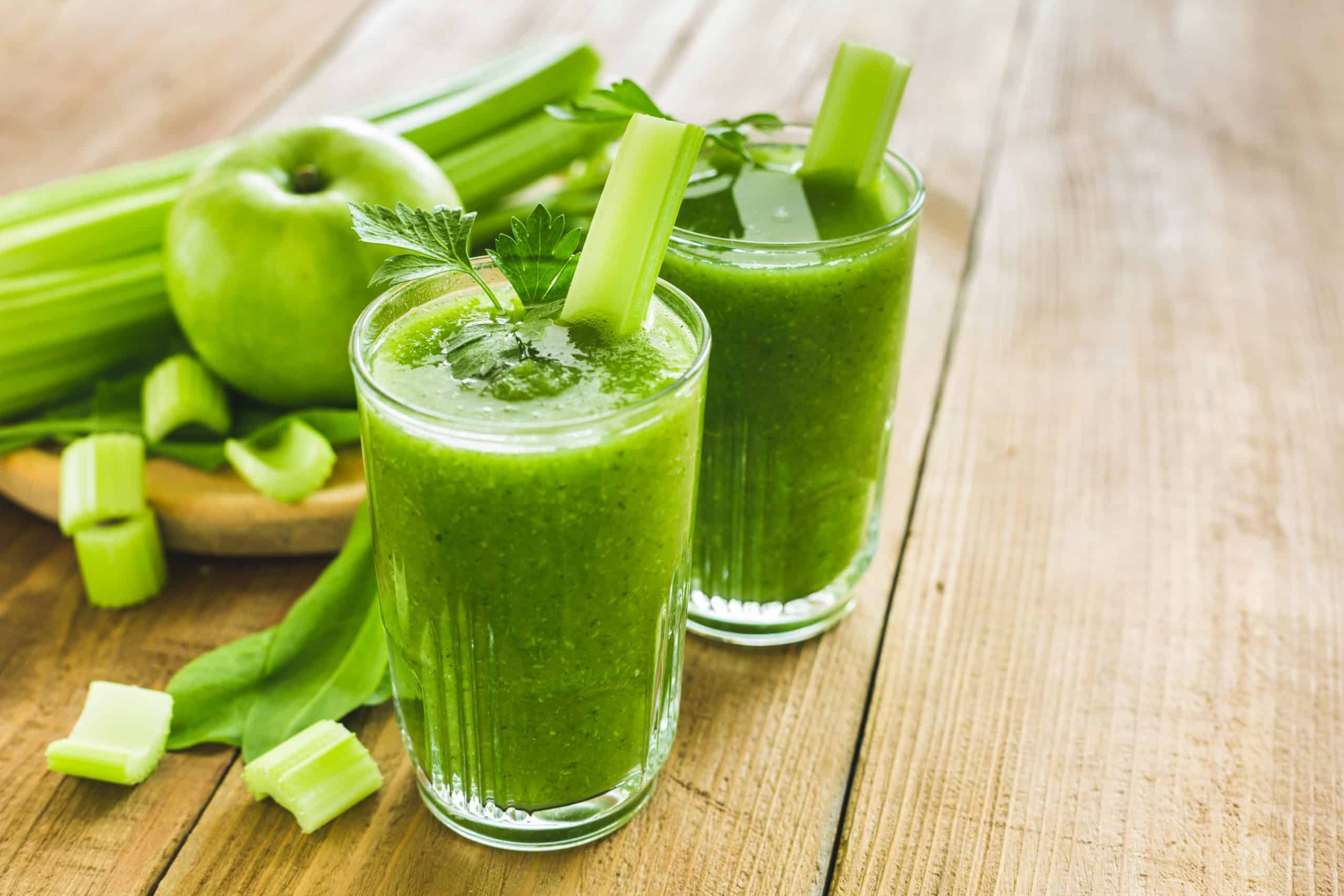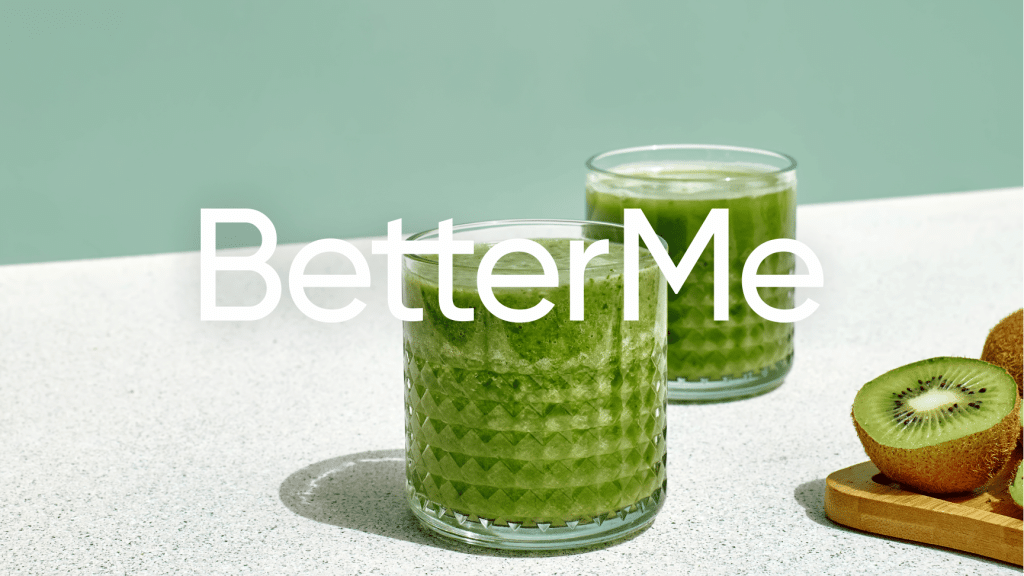You either love or hate the strong, pungent flavor of celery—there’s really no in between. But you should know that there is much more to celery than just its taste. It has a long history of being used for a variety of medicinal purposes (34). More recently, celery has become popular among health and wellness circles as the latest “it” vegetable. Botanically speaking, celery is a member of the parsley family, Apiaceae or Umbelliferae. It was most likely first cultivated in the Mediterranean region, and has been used in traditional Chinese medicine for centuries (34). Not only is celery an excellent source of nutrients, but it is also known to have many health benefits. Here are 6 reasons why you should make celery juice part of your everyday routine.
Get your personalized
meal plan!
What Are The Benefits Of Drinking Celery Juice?
Pungent and crunchy, celery is a versatile vegetable that can be incorporated into both savory and sweet dishes. But its most potent benefits come from drinking it in juice form. Here are 8 reasons to drink celery juice:
1. Boost Your Nutrient Intake
You’ve no doubt heard the word “superfood” being thrown around lately and you probably know that celery is up there with the best of them. Like other superfoods, this fibrous vegetable is jam-packed with vitamins and minerals.
Here is a non-exhaustive list of the nutrients in celery, their quantities in a 240 ml cup of fresh juice, and their associated health benefits (9):
- Protein (2 g): performs necessary functions in the body, such as cell repairs and enzyme production (29).
- Carbs (9.5 g): serves as the body’s main source of energy (8). Part of the carb content in celery comes from dietary fiber that helps keep your digestive system running smoothly.
- Calcium (8% of the RDI): strengthens bones and teeth, as well as helps blood clot, muscles contract, and nerves send messages throughout the body (7).
- Magnesium (7% of the RDI): plays a role in hundreds of biochemical and physiological processes, including muscle contraction and nerve transmission (21).
- Potassium (14% of the RDI): regulates blood pressure and heart rate, as well as assists in muscle function (27).
- Phosphorus (5% of the RDI): essential for healthy bones and teeth, as well as helps your body use carbohydrates and fats (24).
- Sodium (9% of the RDI): helps your body maintain a normal balance of fluids, as well as plays a role in nerve and muscle function (15).
- Vitamin A (7% of the RDI): boosts immunity, vision, and skin health (35).
- Vitamin C (16% of the RDI): helps repair and regenerate tissues, as well as supports healthy bones and skin (36).
- Vitamin K (74% of the RDI): necessary for blood clotting and bone metabolism (30).
In smaller quantities, celery juice also contains B vitamins, such as thiamine, riboflavin, niacin, and folate. These vitamins are essential for energy metabolism, heart health, and brain function (5).
Read More: Celery Juice For Weight Loss: Why It Doesn’t Work, And What To Drink Instead
2. Boost Your Antioxidant Intake
Oxidative damage is one of the major culprits behind chronic diseases, from cancer to heart disease. Basically it’s the result of free radicals—unstable molecules produced by your body’s metabolism—damaging healthy cells (23).
Celery contains more than a dozen antioxidants that can help fight off free radicals. These compounds are especially abundant in celery leaves and stalks; some of the most common ones include caffeic acid, ferulic acid, and coumarins (3).
Caffeic acid is thought to reduce inflammation, while ferulic acid has been linked with a lower risk of cancer (6) (16). Coumarins, on the other hand, are believed to have both anti-cancer and anti-inflammatory properties (12).
Vitamin C is perhaps celery’s most potent antioxidant. The RDI of vitamin C in a cup of celery juice is 16%, meaning that you get a significant dose of this immunity-boosting vitamin with every glass (36). Another antioxidant worth mentioning is beta-carotene, which gets converted into vitamin A in your body.
3. Fight Inflammation
Inflammation is a natural response of the body to injuries and foreign invaders, such as bacteria and viruses. In most cases, inflammation is helpful—it helps protect your body from disease. But when it becomes chronic, this natural response can do more harm than good (20).
Fortunately, celery is rich in compounds known to fight inflammation. For example, the compound luteolin may help reduce inflammation in your digestive tract and joints (1).
Celery is also a good source of polyacetylene, a type of compound that has powerful anti-inflammatory effects. It can help reduce the production of pro-inflammatory molecules, such as cytokines and prostaglandins (4).
4. Boost Gut Health
Your gut plays a major role in your overall health. It’s home to trillions of bacteria, most of which play a major role in digestion and immunity (31).
Research links poor gut health with an increased risk of chronic diseases, such as diabetes and obesity (22). That’s not all; research into the gut-brain axis reveals that a healthy gut can also boost your mood and mental health.
Fortunately, celery is high in dietary fiber and polysaccharides. These compounds can help improve the balance of good and bad bacteria in the gut, as well as reduce inflammation. They may even help protect against chronic diseases, such as irritable bowel syndrome (IBS) (13).
Additionally, celery contains prebiotics, which are compounds that nourish the good bacteria in your gut. This can help increase the number of beneficial species, such as Bifidobacteria and Lactobacillus, while decreasing the number of harmful species like Clostridium (28).
Celery contains compounds called plant lectins. Lectins are proteins that bind to carbohydrates, helping your body absorb them more effectively (33). They can also help reduce the risk of intestinal disorders, such as leaky gut syndrome.
That’s not all celery does to support digestion; it’s fibrous texture can help keep your digestive system running smoothly. This is because celery’s fibers add bulk to your stool, making it easier for you to pass it (12).
Note that any fiber-related digestive benefits of celery may be missed if you’re drinking pure pressed juice. Unless the actual fiber is present in your drink, you may not get all of these benefits.
5. Low Glycemic Hydration
Celery juice is a great way to hydrate your body without spiking your blood sugar levels. That’s because it’s naturally low in sugar and contains very little fructose. That means you can enjoy the hydrating benefits of celery juice without worrying about a sugar crash or blood sugar spikes.
As a substitute for sugary drinks, celery juice can also help you reach your weight loss goals. That’s because it contains almost no calories and can fill you up without adding extra pounds.
Additionally, the fiber content of celery has been linked to improved glycemic response (11).
Dropping pounds by the dozens without putting yourself through the wringer is everyone’s weight loss pipe dream. But what if we told you that the BetterMe app can make that happen? Keep yourself in prime shape with our fat-blasting workouts, delicious budget-sparing recipes, and body-transforming challenges with our app!
6. Alkalizing Effect
Celery is a great way to alkalize your body. This means it can help restore the balance between acidity and alkalinity in your body and promote optimal health. Many of the compounds found in celery are alkalizing, including its fiber content and minerals like magnesium and calcium.
Celery juice is also rich in electrolytes, such as sodium, potassium and chloride. These electrolytes help regulate the acid-alkali balance of your body’s fluids, which is important for proper functioning (15).
Are There Benefits Of Drinking Celery Juice In The Morning On An Empty Stomach?
A popular health trend involves drinking celery juice on an empty stomach in the morning. Proponents of this trend claim it can help with digestion and offer other health benefits. But is there any scientific evidence to back up these claims?
The most notable purported benefit of drinking celery juice in the morning on an empty stomach is its ability to improve digestive health.
Celery juice is believed to be a natural source of electrolytes, minerals, and vitamins that can help support the body’s natural digestive processes. It is also believed to contain a type of flavonoid called apigenin, which has been linked to improved digestion (2).
Another reason why people believe in the benefits of drinking celery juice in the morning is its ability to detoxify and cleanse the body. Proponents of this trend claim that consuming celery juice can help remove toxins from the body and improve overall health.
In reality, there’s not enough scientific evidence to support any of these claims. While celery juice may have some potential health benefits, more research is needed to determine if drinking it on an empty stomach can provide any additional benefits.
The digestive benefits can be achieved by simply eating celery as part of your regular meals, and the detoxifying benefits are unfounded; your body does a great job of naturally detoxifying through regular digestion and elimination.
The benefits of drinking celery juice on an empty stomach may be more psychological than anything else. Drinking it in the morning may promote feelings of well-being and give people a sense of control over their health.
Juicing Vs Eating Celery: Which Is Better?
When it comes to getting the benefits of celery, juicing or eating is largely a personal preference. Both forms have nutritional benefits, but each is also associated with their own advantages and disadvantages.
Juicing: Pros And Cons
The main advantage of juicing celery is that it’s a quick and easy way to get higher amounts of the nutrients from celery in one sitting. Juicing removes the fibrous part of celery, which means it can be absorbed and digested more quickly by your body for quicker nutrient absorption.
Additionally, juicing celery can help you consume more celery than would typically be eaten in a single meal or snack.
Some research shows that celery juice affects bile production in a positive way, which can be beneficial for digestion (19).
The downside of juicing is that it removes the beneficial fiber content of celery. Fiber is an important part of a healthy diet and can help reduce hunger, improve digestion, regulate blood sugar levels, and promote feelings of fullness (18).
Without the fiber, celery juice may not promote the same sense of fullness and satiety that eating celery does.
Additionally, juicing can require a lot of time and energy and can be more expensive than simply eating celery.
Read More: Celery Juice Detox: Does It Work?
Eating Celery Stalks: Pros And Cons
The main advantage of eating celery stalks is that it preserves the fiber content of celery, which can be beneficial for digestion and overall health (18). As part of a delicious, nutrient-dense meal, celery can provide important vitamins and minerals and help promote fullness.
The downside of eating celery stalks is that it offers fewer nutrients at a sitting than celery juice. If you’re looking to get higher concentrations of the vitamins and minerals in celery, juicing may be better.
Additionally, some people find celery difficult to eat on its own due to its flavor and texture.
Does A Celery Juice Cleanse Work?
Proponents of celery juice cleanses claim that drinking large amounts of celery juice in a short period of time can help detoxify and cleanse the body. However, there is no scientific evidence to support this claim.
Your body does an excellent job of cleansing itself through the digestive process, and there is no scientific evidence that celery juice has any special detoxifying powers (25) (26). Additionally, consuming large amounts of celery juice can cause digestive problems such as gas, bloating, and diarrhea.
Other side effects of juicing, include:
High Sodium Intake
Celery is naturally high in sodium, and juicing can concentrate that amount even further. Too much sodium can cause bloating and water retention, and in extreme cases can lead to high blood pressure (14) (32).
Insufficient Nutrition
Juicing can reduce the amount of fiber, vitamins, minerals, and antioxidants that you’re able to consume. This can lead to an overall lack of nutrition, which can have numerous negative health effects.
Want to build an attention-grabbing bubble butt, blast away fat that’s stored in all the wrong places, spring-clean your diet, turn back the clock on your skin, skyrocket your self-confidence and shatter your insecurities? Check out the BetterMe app and set this plan in motion!
Distorted Calorie Balance
Since celery juice is relatively low in calories but high in sugar, it can cause an imbalance between the types of nutrients you consume. This can lead to cravings and weight gain.
Orthorexia, And Other Mental Health Issues
Restrictive diets, such as celery juice cleanses, can lead to an unhealthy obsession with food and nutrition, which can in turn lead to anxiety, depression, and other mental health issues (17).
Conclusion
Celery juice is a great way to boost your nutrient intake, fight inflammation and support gut health. It’s also low in sugar, making it a great substitute for sugary drinks.
In addition, it can help alkalize your body and keep you hydrated. All in all, celery juice has many health-promoting benefits that make it worth adding to your diet.
DISCLAIMER:
This article is intended for general informational purposes only and does not serve to address individual circumstances. It is not a substitute for professional advice or help and should not be relied on for making any kind of decision-making. Any action taken as a direct or indirect result of the information in this article is entirely at your own risk and is your sole responsibility.
BetterMe, its content staff, and its medical advisors accept no responsibility for inaccuracies, errors, misstatements, inconsistencies, or omissions and specifically disclaim any liability, loss or risk, personal, professional or otherwise, which may be incurred as a consequence, directly or indirectly, of the use and/or application of any content.
You should always seek the advice of your physician or other qualified health provider with any questions you may have regarding a medical condition or your specific situation. Never disregard professional medical advice or delay seeking it because of BetterMe content. If you suspect or think you may have a medical emergency, call your doctor.
SOURCES:
- Anti-inflammatory effects of luteolin: A review of in vitro, in vivo, and in silico studies (2018, sciencedirect.com)
- Apigenin Impacts the Growth of the Gut Microbiota and Alters the Gene Expression of Enterococcus (2017, mdpi.com)
- A Review of the Antioxidant Activity of Celery (Apium graveolens L) (2017, journals.sagepub.com)
- Bioactive polyacetylenes in food plants of the Apiaceae family: occurrence, bioactivity and analysis (2006, pubmed.ncbi.nlm.nih.gov)
- B Vitamins: Functions and Uses in Medicine (2012, ncbi.nlm.nih.gov)
- Caffeic Acid on Metabolic Syndrome: A Review (2021, mdpi.com)
- Calcium (2022, ods.od.nih.gov)
- Carbohydrates as a source of energy (1994, pubmed.ncbi.nlm.nih.gov)
- Celery juice (2020, fdc.nal.usda.gov)
- Coumarins and Coumarin-Related Compounds in Pharmacotherapy of Cancer (2020, mdpi.com)
- Dietary Fiber and Metabolic Syndrome: A Meta-Analysis and Review of Related Mechanisms (2017, mdpi.com)
- Dietary fibre in foods: a review (2012,.ncbi.nlm.nih.gov)
- Dietary Fibre Modulates the Gut Microbiota (2021, mdpi.com)
- Effects of the DASH Diet and Sodium Intake on Bloating: Results From the DASH–Sodium Trial (2020, ncbi.nlm.nih.gov)
- Electrolytes (2022, ncbi.nlm.nih.gov)
- Ferulic Acid: Therapeutic Potential Through Its Antioxidant Property (2007, ncbi.nlm.nih.gov)
- Food and mood: how do diet and nutrition affect mental wellbeing? (2020, ncbi.nlm.nih.gov)
- Health benefits of dietary fiber (2009, academic.oup.com)
- Hepatoprotective effect of feeding celery leaves mixed with chicory leaves and barley grains to hypercholesterolemic rats (2011, ncbi.nlm.nih.gov)
- Inflammatory responses and inflammation-associated diseases in organs (2017, ncbi.nlm.nih.gov)
- Magnesium and Human Health: Perspectives and Research Directions (2018, hindawi.com)
- Obesity, Diabetes, and Gut Microbiota (2010, ncbi.nlm.nih.gov)
- Oxidative stress, aging, and diseases (2018, ncbi.nlm.nih.gov)
- Phosphorus (2015, academic.oup.com)
- Physiology, Liver (2022, ncbi.nlm.nih.gov)
- Physiology, Renal (2022, ncbi.nlm.nih.gov)
- Potassium and Health (2013, sciencedirect.com)
- Prebiotics: Definition, Types, Sources, Mechanisms, and Clinical Applications (2019, mdpi.com)
- Protein Function – Molecular Biology of the Cell (2002, ncbi.nlm.nih.gov)
- Review: The health benefits of vitamin K (2015, ncbi.nlm.nih.gov)
- Role of the normal gut microbiota (2015, ncbi.nlm.nih.gov)
- Sodium Intake and Hypertension (2019, mdpi.com)
- Structure-function and application of plant lectins in disease biology and immunity (2019, ncbi.nlm.nih.gov)
- Value Added Products, Chemical Constituents and Medicinal Uses of Celery (Apium graveolens L.) -A Review (2015, researchgate.net)
- Vitamin A in Health and Disease (2019, intechopen.com)
- Vitamin C in Disease Prevention and Cure: An Overview (2013, ncbi.nlm.nih.gov)










